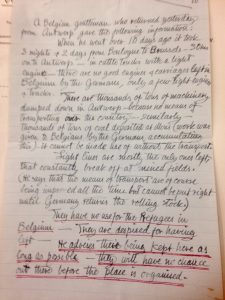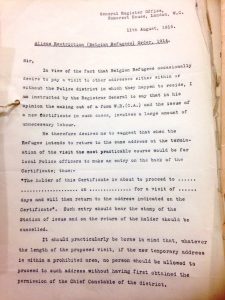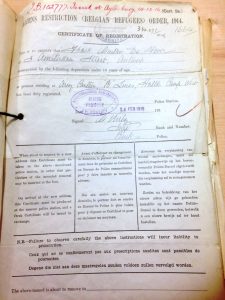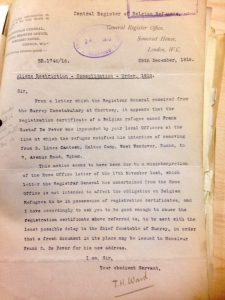As a member of the CREATE Group I volunteered to research a part of the history of the Belgian Refugees who came over to the UK between 1914 – 1919, a number of whom were sent to Tunbridge Wells and housed in the town. From a recent visit to Belgium and Northern France to visit the Battlefields and Cemeteries of the First World War I developed a better understand of why Britain felt duty-bound to come to the rescue of Belgium, and declared war on Germany. Belgium had done all they could to hold the Germans back but were finally overrun, and thus hundreds of Belgians were forced to abandoned their country for Britain leaving the British, French and Commonwealth armies to fight the Germans and prevent them taking control of the coastal area.
The following report, held at the National Archives at Kew, regarding the situation in Belgium, gives some idea of how desperate and difficult it became for the refugees and the desperate state Belgium was in.

For those administrating this influx of refugees, it was an enormous task. They were sent instructions on how to register the individuals on arrival by the Central Register of Belgian Refugees at Somerset House in London. However, a lot of confusion arose when those refugees wanted to move from one area of the country to another either on a temporary basis or permanent. It made me realise how much more difficult it must have been to administer all these refugees, when the war was going on, and mail deliveries were likely to be delayed, or mail lost, and telephone lines cut due to bombing, and transport services restricted. Nowadays we have so many ways of communicating, and travelling which make life much easier. Despite this we managed to control the refugees, and people all over Britain did their best to welcome, help, house and support them.
On 20 April 2017 I joined a group of volunteers to visit the National Archives at Kew. Whilst there we were able to review a number of boxes containing registration information of Belgian refugees, and my task was to check boxes of registration cards to find any cards for refugees who came to Tunbridge Wells. I also studied letters and memos between the Central Register Office (CRO) and police forces and other departments who dealt with the refugees and their movements. It became clear that the instructions from CRO were not necessarily interpreted correctly by some of the police forces. For example apart from being issued with the initial Registration Certificate by the CRO, the refugees were also issued with an Identity Book by the police, both of which they were allowed to hold, but some police forces misinterpreted the instruction and confiscated the Registration Certificate when the refugee was issued with the Identity Book. The Identity Book was supposed to contain details of the addresses and movements of the refugee, and had to be updated whenever he or she needed to leave one area, whether it was for a short visit, or a permanent move to another town. They were not supposed to have passports, but only these documents/books. As can be seen in this letter some adjustments had to be made to simplify these Certificates and movement records.

You will see what happened to Mr Frank Gustav de Fever from receiving his Registration Certificate.

The confusion arose where Registration Certificates were also issued by the police, in addition to the Home Office Certificate. The one issued by the police was supposed to be confiscated but not the one issued by the Home Office! Refugees were not supposed to hold passports once they had these certificates and Identity Books. Note the following letter regarding Mr Frank Gustav de Fever after he had received his RC and wanted to move from one area to another.

From my research it appears our Tunbridge Wells refugees underwent similar problems but they managed to settle down in the town in the houses, hostels and rooms offered to them. They were also assisted in finding jobs so they could support themselves, and their children went to schools in Tunbridge Wells and become members of the whole community, and developed their own social life as well.
